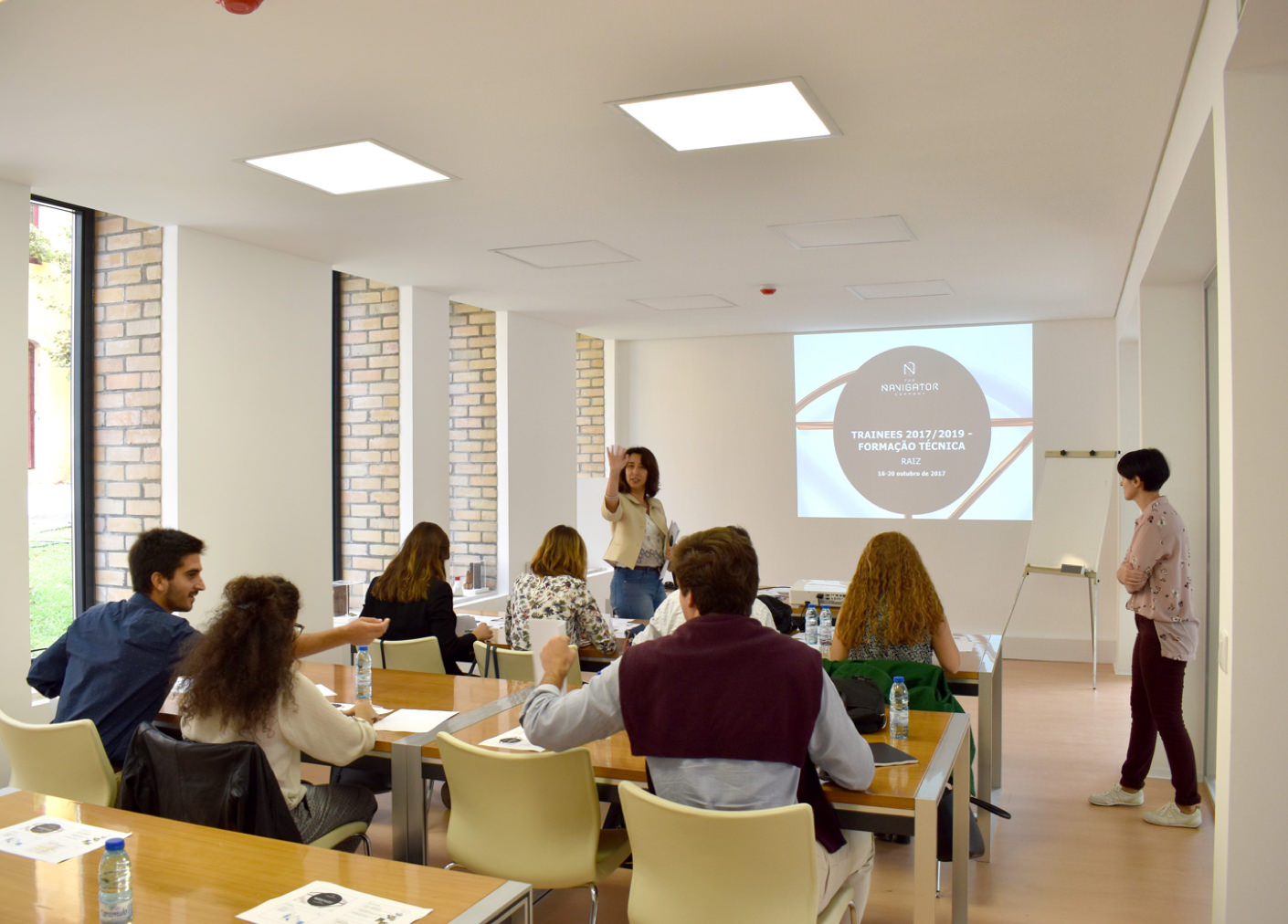Our services and specialized consultancy represent the Institute’s commitment to producing excelling knowledge, aiming to increase the competitive advantage and productivity of the forest, pulp, and paper industry.
Our services and specialized consultancy represent the Institute’s commitment to producing excelling knowledge, aiming to increase the competitive advantage and productivity of the forest, pulp, and paper industry.

The objective of genetic improvement is to deliver to The Navigator Company large-scale production nurseries eucalypt genetic materials (clones and seed) more productive, suitable for the production of pulp and paper and well adapted to the different soils and climate conditions in Portugal, as well as tolerant to major pests and diseases.
Selected clones are integrated in a recommendation that includes information about performance and preferential allocation in distinct areas of the country.
In biotechnology molecular tools are applied in order to support the development of eucalypt improved genetic materials (clones and seed), through:
This area is also dedicated to look for new techniques aiming to circumvent current bottlenecks in the deployment of improved clones, for example through micropropagation and mini-cuttings production.
This area aims to provide guidelines that will increase the operational production of improved clonal and seedling plants through:
This area is also dedicated to investigating state-of-the-art knowledge on eucalypt flowering and improved seed production strategies, to offer open-pollinated seed orchard management guidelines.
With a focus on the efficient use of resources, in a sustainable forest management perspective, RAIZ develops techniques that foster productivity, considering natural site climatic and soil conditions:
The objective of this work is to minimize the impact of pest and diseases in eucalypt plantations, through the development of biotic risk monitoring tools for forest plantations and integrated control methods for pests, diseases and invasive plants (pests sensu lato), which often cause damage or compete with eucalypt plantations, and are essential for maintaining forest health and vitality.
Integrated pest management strategies are always favored, including methods of resistance or genetic tolerance, biological control, biotechnical control and, as a last resort, targeted chemical control. Biological control has been privileged by RAIZ, through the study of new organisms with the potential to be used as biological control agents.
Forest and environment are inseparable, since natural forests and often forest plantations are part of the rural landscape and in fact a basic requirement for ecological balance and the regulation of ecosystem services.
In this sense, it is part of RAIZ’s mission to generate knowledge and develop forest production technologies that favor the rational use of natural resources, the valorization of ecosystem services and the preservation of the environment. These aspects are considered in all forest R&D projects.
Forest consulting mission is:
Some of the main tools developed for the company were the criteria to establish site quality for eucalypt planting, which take into account climate and soil characteristics, land topography and biotic and abiotic risks. For each site condition, the expected eucalypt wood yield is estimated.

New applications are developed for industrial sub-products, within the context of circular economy, and emerging areas such as biorefinery and bio-products.
The efficient use of resources, environment preservation and the sustainability of the value chain, are transversal and central topics of the Technological R&D and Consulting area.
RAIZ has well-established competencies and knowledge on the technological evaluation and characterization (chemical and morphological) of wood and forest products as raw materials for the production of cellulosic pulp, as well as for new applications, namely within the context of a biorefinery.
The evaluation of other raw materials with the potential to provide differentiating functionalities to paper products is also ensured.
RAIZ develops activities aiming the optimization of pulping and bleaching processes, effluent treatment and process residues and by-products upgrading, within the context of circular economy.
In parallel to the conventional pulp productions processes, RAIZ, in cooperation with its academic and R&D partners, develops new biomass deconstruction processes within the context of forest-based biorefineries.
Cellulosic pulp, as a product, is an important research area, from the point of view of its papermaking performance (printing & writing, packaging and tissue) as well as its aptitude for other domains of application, namely for decor papers.
RAIZ also develops new applications for pulp, by using cellulosic fibers as reinforcement elements in thermoplastic biocomposites, for producing non-wovens, or by the fractionation of its components into cellulose (micro- or nano-fibrillated) and hemicelluloses, and looking for new applications for these materials/products.
RAIZ develops basic knowledge, crucial to the understanding and improvement of the papermaking process, and knowledge of functional properties and product differentiation between printing-writing paper, packaging paper and tissue paper.
In this area RAIZ studies pulp beating, the interaction of different components in “wet end chemistry,” surface treatment and converting to final product. New paper applications, namely on packaging and flexible electronics, are also developed with partner R&D centers.
The implementation of the biorefinery concept in pulp and paper mills is one important challenge to RAIZ Technological R&D and consulting area as well as for its academic and R&D partners.
The research activity covers processes for the fractionation, conversion (chemical, thermochemical, biological) and separation of biomass components. Products with major focus include bioactive compounds from leaves and bark, new materials and bioproducts from cellulose, hemicelluloses, sugars and lignin as well as biofuels obtained by (bio)(thermo)chemical conversion of biomass and biomass components.
In the environment context, the reduction of resources consumption, the development and evaluation of technologies allowing the removal or reduction of emissions from liquid and gaseous effluents area crucial areas of activity. RAIZ is a partner of National and European pulp-and-paper sector in the development of environmental legislation within the context of BREF or ecological labels.Technological Consulting activity covers the pulp and paper process, environment and energy, aiming to find solutions for the optimization of operations, allowing us to face new industrial, economic and legislative challenges, serving The Navigator Company as well the pulp-and-paper sector.
In the environment context, the reduction of resources consumption, the development and evaluation of technologies allowing the removal or reduction of emissions from liquid and gaseous effluents area crucial areas of activity. RAIZ is a partner of National and European pulp-and-paper sector in the development of environmental legislation within the context of BREF or ecological labels.
RAIZ develops knowledge in technologies for functionalizing paper for packaging, with a focus on developing barrier properties to meet the packaging requirements of the food market and other business areas, with high quality demands.
The Institute also has expertise in the surface treatment of paper using coating, extrusion and lamination coating processes, and in the characterization of surface and barrier properties.
RAIZ is developing knowledge in the production of molded cellulose articles based on eucalyptus fiber that can replace single-use plasticsThe barrier properties to water and fatoil and grease are also fundamental characteristics of this type of packaging, therefore, extensive research work has been carried out to developachieve this type of properties. The Institute is capable of producing this type of articles with different formulations.The barrier properties to water and fatoil and grease are also fundamental characteristics of this type of packaging, therefore, extensive research work has been carried out to developachieve this type of properties. The Institute is capable of producing this type of articles with different formulations., for the food sector.
The barrier properties to water and oil and grease are also fundamental characteristics of this type of packaging, therefore, extensive research work has been carried out to achieve this type of properties. The Institute is capable of producing this type of articles with different formulations.
The technological scouting activity developed at RAIZ is a part of a global scouting network within The Navigator Company.
This area promotes:
- The monitoring of the evolution of base technologies and products;
- The analyses of new technologies and products with innovative or disruptive potential, nationally and internationally, which may represent opportunities for the company.
RAIZ technological scouting also participates actively in the implementation of The Navigator Company Industrial Property (IP) strategy.
The results of research carried out at RAIZ are essentially endogenized in the production areas and products of The Navigator Company core business: forest, pulp, paper (printing & writing and tissue) and energy.
However, there is a clear growth of R&D and disruptive innovation activities with the potential to generate new products and businesses, namely on the emerging areas of biorefineries, circular economy and new applications of pulp and paper.
The RAIZ “Demonstration, Scale-Up and New Businesses” activity is a part of an internal network at the Company, aiming the detection, demonstration (proofs of concept), scale-up and techno-economic feasibility of new processes and products resulting from R&D and disruptive innovation, with potential to generate new businesses and start-ups.

